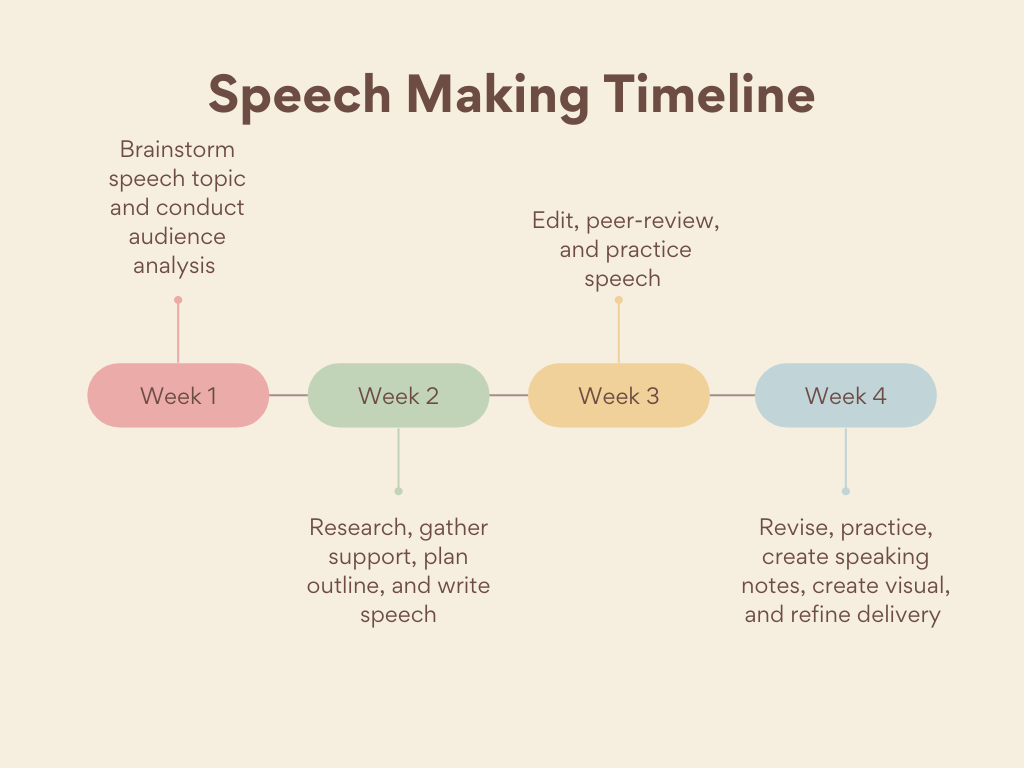What are the Skills For An Extemporaneous Speaker?
What is the most important skill for an extemporaneous speaker? If you’ve ever been in a situation where you had to speak on the spot, you know how challenging it can be to articulate your thoughts clearly and confidently. That’s why the skill of improvisation is crucial for extemporaneous speaking. Being able to think on your feet and deliver a well-structured and persuasive speech is a valuable talent that can benefit you in various aspects of life.
Improvisation is more than just making things up as you go along. It requires the ability to think critically, analyze information quickly, and organize your thoughts effectively. When speaking extemporaneously, you don’t have the luxury of time to meticulously prepare and rehearse your speech. Instead, you must rely on your wit, knowledge, and communication skills to deliver a compelling presentation.
Even though extemporaneous speaking may seem daunting, it provides several advantages. It allows you to connect with your audience, adapt to different situations, and demonstrate your ability to articulate ideas off the cuff. Whether you’re giving a presentation in school, participating in a debate, or interviewing for a job, the skill of extemporaneous speaking can set you apart and make a lasting impression.
In the following article, we will explore the strategies and techniques involved in becoming a proficient extemporaneous speaker. We’ll delve into the importance of preparation, the art of improvisation, and the key elements that make a remarkable extemporaneous speech. So, if you’re ready to enhance your communication skills and master the art of thinking on your feet, let’s dive in!

The Most Important Skill for an Extemporaneous Speaker: Mastering the Art of Impromptu Speaking
Impromptu speaking is an essential skill that can greatly enhance one’s ability to communicate effectively in various situations. Whether you’re delivering a speech, participating in a debate, or leading a meeting, being able to think on your feet and express your thoughts eloquently is key to commanding attention and influencing others. In this article, we will explore the most important skill for an extemporaneous speaker and delve into the strategies, techniques, and benefits of mastering the art of impromptu speaking.
1. Confidence: The Foundation of Impromptu Speaking
Confidence is the bedrock upon which all other skills in impromptu speaking are built. When faced with the pressure of speaking off-the-cuff, having confidence in your abilities will enable you to embrace the challenge rather than shy away from it. Confidence allows you to project a strong presence, engage your audience, and deliver your message with conviction.
To build confidence as an extemporaneous speaker, it’s crucial to practice regularly. Take every opportunity to speak impromptu, whether it’s in casual conversations or in more formal settings. Engage in activities that boost your self-assurance, such as joining a public speaking club or seeking feedback from trusted mentors. Remember that confidence comes from knowing your subject matter and being comfortable with your own unique speaking style.
Benefits of Developing Confidence as an Extemporaneous Speaker:
– Improved self-esteem and self-assurance
– Increased credibility and persuasive power
– Enhanced communication skills in various professional and personal scenarios
– Ability to seize opportunities and overcome unexpected challenges
– Development of a strong personal brand and reputation as a skilled communicator
2. Thinking on Your Feet: The Power of Rapid Decision-Making
In impromptu speaking, being able to think on your feet is crucial. It allows you to quickly analyze information, organize your thoughts, and deliver coherent and persuasive arguments or messages. Rapid decision-making is an essential skill that can be developed through practice and mental agility.
One strategy to improve your ability to think on your feet is to engage in activities that require spontaneous responses, such as participating in debate clubs, taking part in improv theater workshops, or engaging in impromptu speaking challenges with friends or colleagues. By pushing yourself outside of your comfort zone and embracing these opportunities, you’ll develop the mental dexterity needed to respond effectively in impromptu settings.
Benefits of Mastering the Skill of Thinking on Your Feet:
– Increased adaptability and flexibility in professional and personal environments
– Enhanced problem-solving skills
– Improved critical thinking ability
– Confidence in handling unexpected situations
– Ability to influence and persuade others with well-reasoned arguments
3. Structure and Organization: Crafting Coherence on the Spot
Structure and organization are often underestimated aspects of impromptu speaking. Many people believe that spontaneous speaking is synonymous with disorganized ramblings. However, the skillful extemporaneous speaker knows the importance of presenting ideas in a clear and logical manner, even when speaking off-the-cuff.
To develop your ability to structure and organize your impromptu speeches effectively, practice creating a mental framework before you start speaking. This can include outlining the main points you want to cover, using simple transition phrases to guide your audience, and ensuring a clear introduction and conclusion. By practicing this mental framework regularly, you’ll become more adept at presenting your thoughts in a coherent manner, even without prior preparation.
Benefits of Mastering Structure and Organization as an Extemporaneous Speaker:
– Enhanced clarity and understanding of your message
– Increased credibility and professionalism in impromptu speaking situations
– Improved audience engagement and retention of key ideas
– Development of strong communication skills that can be applied in both formal and informal settings
– Ability to adapt your message to any impromptu speaking scenario
4. Engaging the Audience: The Art of Connection
One of the most important skills for an extemporaneous speaker is the ability to engage the audience and create a meaningful connection. Impromptu speaking offers a unique opportunity to connect with listeners in a genuine and authentic way, as it allows for immediate and unfiltered responses.
To engage your audience effectively, focus on active listening and responding to their reactions. Pay attention to their body language, facial expressions, and verbal cues, and modify your speech accordingly. Aim to create a conversation rather than a monologue by incorporating questions, anecdotes, and relatable examples. By making your audience feel seen and heard, you’ll establish a strong rapport and leave a lasting impact.
Benefits of Engaging the Audience as an Extemporaneous Speaker:
– Increased audience receptiveness and interest
– Improved ability to connect with diverse groups of people
– Enhanced persuasive power and influence
– Development of strong interpersonal and communication skills
– Ability to captivate and inspire listeners in various settings
5. Adaptability: Thriving in Changing Environments
Adaptability is a vital skill for an extemporaneous speaker. Being able to thrive in changing environments and adjust your message to different audiences or circumstances is key to delivering effective impromptu speeches.
To develop adaptability, expose yourself to a variety of speaking situations and diverse audiences. Seek opportunities to speak on different topics, engage with people from various backgrounds, and present in various formats such as conferences, panel discussions, or workshops. By embracing these experiences, you’ll become more comfortable with unexpected changes and more skilled in tailoring your message to suit different situations.
Benefits of Developing Adaptability as an Extemporaneous Speaker:
– Enhanced versatility in professional and personal environments
– Increased ability to connect with and influence diverse audiences
– Improved confidence in handling unexpected challenges
– Provision of valuable insights and perspectives in impromptu settings
– Development of a reputation as a flexible and reliable communicator
#More Three Relevant H2 Headings With Detailed Information:
Mastering the Art of Impromptu Speaking: Tips and Techniques
Now that we’ve explored the most important skills for an extemporaneous speaker, let’s delve into some practical tips and techniques to help you master the art of impromptu speaking. Whether you’re a seasoned speaker looking to refine your impromptu skills or a beginner looking to gain confidence in spontaneous speaking, these strategies will help you excel in any impromptu situation.
1. Practice Regularly
As with any skill, practice is essential for improving your impromptu speaking abilities. Dedicate time each day to practice impromptu speaking, even if it’s just for a few minutes. You can do this by speaking off-the-cuff on various topics, engaging in impromptu debates with friends or colleagues, or participating in impromptu speaking events such as Toastmasters’ Table Topics sessions. The more you practice, the more comfortable and confident you’ll become.
2. Embrace Silence
When faced with an impromptu speaking situation, it’s natural to feel the urge to fill every moment with words. However, embracing silence can be a powerful tool in impromptu speaking. Take a moment to gather your thoughts, breathe, and compose yourself. Embracing silence allows you to collect your ideas, organize your thoughts, and deliver a more concise and impactful message.
3. Listen and Observe
Active listening and observation skills are essential for successful impromptu speaking. Pay attention to the topic, the audience, and any cues or reactions. Listen actively to what others are saying and use that information to craft your response. By truly understanding the context and needs of your audience, you’ll be able to deliver a more tailored and impactful impromptu speech.
#Key Takeaways and Recommendations
Mastering the skill of impromptu speaking is a valuable asset in both personal and professional contexts. Through developing confidence, thinking on your feet, structuring your thoughts, engaging your audience, and embracing adaptability, you’ll be well-equipped to excel in any impromptu speaking situation.
Remember, practice is key to honing your impromptu speaking skills. Dedicate time each day to regular practice, seek out opportunities to engage in impromptu speaking activities, and continuously refine your techniques. With perseverance and a commitment to growth, you’ll become a confident and effective extemporaneous speaker.
So, whether you’re aiming to give impactful speeches, ace job interviews, or simply become a more confident communicator, mastering the art of impromptu speaking is the most important skill you can develop. By being able to think on your feet, connect with your audience, and deliver well-structured and compelling speeches, you’ll not only boost your own self-assurance but also leave a lasting impression on those around you.
Key Takeaways: skills for an extemporaneous speaker?
- A strong command of the subject matter is crucial for an extemporaneous speaker.
- Being able to think quickly and adapt to unexpected situations is essential.
- Effective organization skills help the speaker deliver a coherent and structured speech.
- Confidence and good public speaking skills are necessary for engaging the audience.
- Practice and preparation improve the speaker’s ability to deliver impromptu speeches.
Frequently Asked Questions
Extemporaneous speaking requires a diverse skill set, but one stands out as the most important for any speaker. Here are some common questions about the most important skill for an extemporaneous speaker and insightful answers to help you understand it better.
What is the secret to being an effective extemporaneous speaker?
The secret lies in the ability to think on your feet, also known as quick thinking. This skill allows speakers to generate coherent and compelling ideas on the spot, making their speeches engaging and impactful.
Quick thinking involves being able to organize your thoughts, analyze information with speed, and adapt your message to any given situation. By mastering this skill, speakers can confidently respond to unexpected questions, share their viewpoints, and connect with their audience in a genuine and effective way.
How can quick thinking be developed for extemporaneous speaking?
Developing quick thinking skills requires practice and preparation. One effective technique is to regularly engage in extemporaneous speaking exercises, where you are given a topic and a limited time to prepare a response.
Additionally, staying informed about current events, reading widely, and discussing various topics with others helps to expand your knowledge and improve your ability to think critically. By exposing yourself to diverse perspectives, you develop the mental agility necessary for quick thinking.
Is confidence an important skill for an extemporaneous speaker?
Absolutely! Confidence plays a vital role in extemporaneous speaking. When you’re confident, you exude credibility and captivate your audience. It allows you to speak with clarity, conviction, and authority.
Building confidence can be achieved through practice, preparation, and experience. By rehearsing your speeches, refining your delivery skills, and seeking opportunities to speak in front of an audience, you become more comfortable and confident in your abilities.
Do extemporaneous speakers need good listening skills?
Yes, listening skills are crucial for extemporaneous speakers. Effective listening allows speakers to fully understand questions or prompts, gather relevant information, and respond appropriately.
Developing good listening skills involves paying close attention, avoiding distractions, and actively processing the information being communicated. By honing your ability to listen effectively, you can gather the necessary information to construct thoughtful and well-informed responses.
What role does body language play in extemporaneous speaking?
Body language is a significant element of extemporaneous speaking. It includes gestures, facial expressions, posture, and movement. Strong and purposeful body language adds impact to your words, conveying confidence, enthusiasm, and engagement to your audience.
Practicing positive body language, such as maintaining eye contact, using purposeful hand gestures, and standing tall, helps enhance your delivery and overall message. Being aware of your body language ensures that your non-verbal cues align with your words, creating a powerful and persuasive speaking presence.

Summary
Being a good extemporaneous speaker is all about preparation and being adaptable. It’s important to have knowledge on different topics, think on your feet, and engage with the audience. While practice is essential, being confident in your abilities is key.
Developing good communication skills and building a strong foundation of general knowledge are crucial. Being aware of current events allows you to connect with your audience and present well-rounded arguments. Remember, the most important skill for an extemporaneous speaker is the ability to adapt and respond effectively in any situation.


